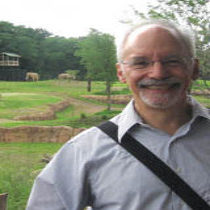Landscape Architecture for Landscape Architects › Forums › STORY BOARD › another over-programmed playground by architects
- This topic has 1 reply, 9 voices, and was last updated 12 years, 2 months ago by
 Andrew Garulay, RLA.
Andrew Garulay, RLA.
-
AuthorPosts
-
December 18, 2013 at 9:37 pm #153488
 Roland BeinertParticipant
Roland BeinertParticipantok, you got me, Trace. I have no clue how or even if they sterilize the foam pieces.
December 19, 2013 at 2:45 am #153487 CalicoParticipant
CalicoParticipantBizarro world? Looks like I picked the wrong week to quit dropping acid. But I digress.
The vast majority of play structures I see are privately owned and operated, although we do have some decent publicly owned parks here in Flyover Nation. The play structures, for the most part, all look the same, much like the sterile breeding box neighborhoods surrounding them. It’s getting old. As a parent, I welcome some – any – creativity in playground design and wouldn’t mind doing it myself professionally; it’s simply not my niche, and I am not interested in taking the business that way.
Perhaps my ego is not big enough?
With regard to specifying a particular product, I do it frequently, and even leave out the “or approved equal” if I happen to feel that the product in question is strong enough. Proprietary specs are, in fact, perfectly legal when working for private concerns, although I have been asked to add the “or equal” a few times. That said, writing a very tight spec to ensure that only one product could be used is not difficult, and I would bet has been done in playground design for public entities many, many times.
December 19, 2013 at 8:04 am #153486 Trace OneParticipant
Trace OneParticipantHm.Oh, well, not where I live. Which is the land where all the children are below average. But I work for a huge gov. organization, and we have to jump through hoops and end up spending lots and lots of taxpayer money on intricate in-house designs to avoid the single product spec problem.
But still, as a parent, this idea of a playground based on plastic blocks seems cheap and sort of gross.
To each his own.
December 19, 2013 at 11:29 am #153485 Rob HalpernParticipant
Rob HalpernParticipantThis concern about germs surprises me. For one thing, more and more research is suggesting that our germ-phobia is making for more sickly children not healthier ones. Second, how many kindergartens and play groups sterilize all the toys and surfaces daily? This is a red herring.
The park was designed by a landscape architect.
It is simply a different kind of playground from what we played in as kids.
No reason to condemn it without seeing how the kids and families actually use it.
December 19, 2013 at 11:57 am #153484 Trace OneParticipant
Trace OneParticipantReally, Rob? I agree, I won’t criticize any more until I have used one, but the use of plastic, plastic grass, plastic ball rooms at McDonalds – it just grosses me out. That is not to say I object to plastic grass, or even plastic (Martha Stewart) in the right place.(please, can we use plastic for ornamental plantings on the highway, instead or irrigated maintenance nightmares!) . But I don’t like the urine soaked plastic ball rooms at mcDonalds, and I don’t think I want my kids playing with the stuff many many other kids have drooled over, especially if it is plastic and does not have any organic ability to eat the garbage thrown at it, as I imagine fungus on a tree bark might..Yes we need to be exp osed to more germs, but do we need to be exp osed to more plastic? To me, it is the oppostie of what we need in our environments. Europe has banned BTH, I think it is, the plastic softener, so all the stuff gets dumped on our baby bottles and toys – it is bad for you.
Conversely, did you know that polio became MORE deadly BECAUSE of plumbing and clean water – before, mothers all had it, and immunized babies. With the advent of increased availability to have access to clean water in the US, polio was able to take advantage of a new generation’s immune deficiency and FDR got hit.
But I do love to argue about playgrounds, don’t you? One of my favorite topics, along with stair height and use, or perhaps railings..
December 19, 2013 at 12:33 pm #153483 Trace OneParticipant
Trace OneParticipantI did not mean “conversely” re: polio. That was an incorrect use of word due to brain entanglement. I mean more like, did ya hear this one about germ exposure and lack thereof… FDR got polio because of cleaner water..
December 19, 2013 at 1:25 pm #153482 Trace OneParticipant
Trace OneParticipantI think the point of this concept being too ‘programmatic’ for a playground is also being missed. Lets assume we can judge in the concept phase – sometimes you have to, right? I see in this design a ‘play-ground’ that is dictating it’s use. I would like a more passive, natural area, to let the kids brains cool off and wander, for once, looking at clouds. Or blades of grass. What is more complex than a blade of grass?
December 19, 2013 at 3:24 pm #153481 Tosh KParticipant
Tosh KParticipantI do agree about the programmatic – the concept of “free play” in the imagination playground is rather sad when the designer/provider is controlling the pieces to be played with (and time and context). My guess us that in the dense neighborhoods this is somewhat fitting (for better or for worse) and the passive natural area is provided by Prospect Park.
My impression from the rendering is that reminds me of the dog park down by Chelsea pier (in form and elements). It appears to be able to be hosed down. The other place it reminds me is of the playground by the zoo in Central Park (where the kids look like they’re in a zoo exhibit, somewhat appropriately). In some ways this may speak to as how the designer and client see children…
December 27, 2013 at 4:59 pm #153480 Daniel JostParticipant
Daniel JostParticipantRockwell Group were the ones who came up with the whole Imagination Playground concept, which combines large foam blocks, water, and sand. They actually designed the foam blocks.
-
AuthorPosts
- You must be logged in to reply to this topic.


